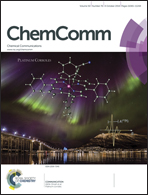Benzothiazole derivatives augment glucose uptake in skeletal muscle cells and stimulate insulin secretion from pancreatic β-cells via AMPK activation†
Abstract
Adenosine monophosphate-activated protein kinase (AMPK) has been identified as one of the major targets for antidiabetic drugs. This study describes two AMPK-activating agents 2-(benzo[d]thiazol-2-ylmethylthio)-6-ethoxybenzo[d]thiazole and 2-(propylthio)benzo[d]thiazol-6-ol, that increase the rate of glucose uptake in L6 myotubes and also augment glucose-stimulated insulin secretion in INS-1E β-cells and rat islets. We believe that such unique bi-functional compounds can be further used for the development of a new class of antidiabetic drugs.


 Please wait while we load your content...
Please wait while we load your content...